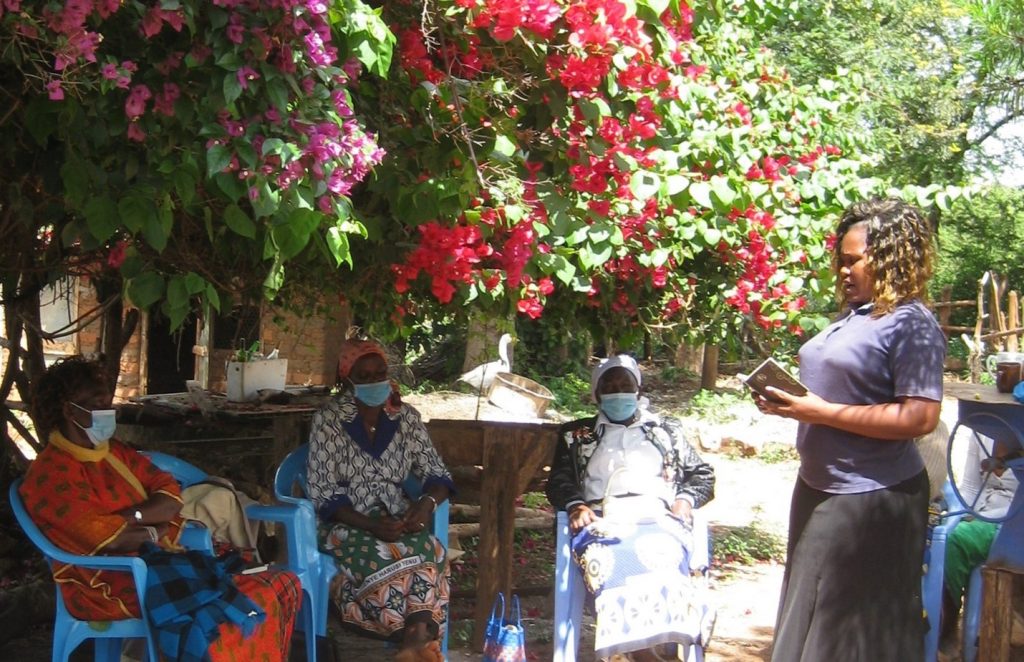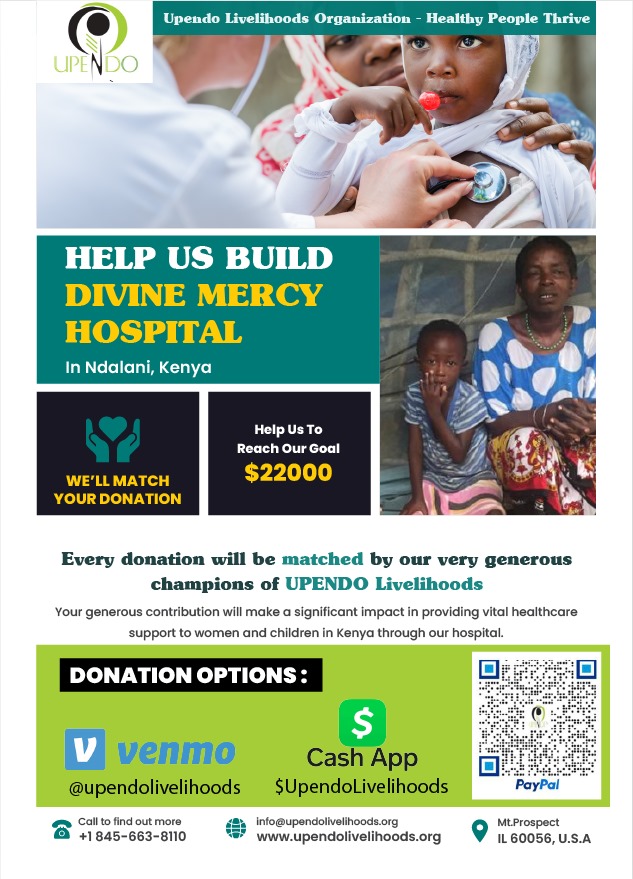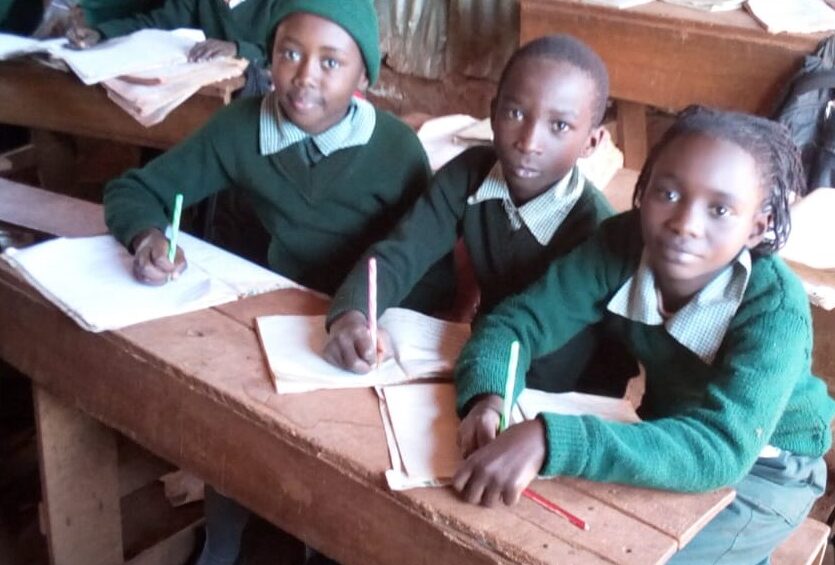Our Programs
Proposed Health Clinic in Ndalani, Yatta-Kenya
Redempta is a resident of the arid and semi-arid region of Ndalani in Yatta, Kenya. When her husband died suddenly Redempta and her mother in law started a group to help find a solution to better access to medical help and thought of getting people together to look for help to establish a medical clinic in the community: “My husband was unable to get medical help in time to save his life. It has been a very difficult for me and my children since my husband and the sole family bread winner passed away. I hate to think that other lives will be lost because of lack of access to medical help. Redmpta and the group have started a tree nursery to plant trees at the proposed site her mother-in-law has given to establish a clinic. Your donation will help build the clinic and reduce suffering for the people of Ndalani.
This UPENDO innovation aims to improve access to medical help, food and nutrition for pregnant and breastfeeding mothers, newborns, and young children, and to communicate accurate information on maternal, infant, and young child nutrition.
The roads in Ndalani are poor and inaccessible. people have to walk far to access health services. These health services are and not affordable to majority of the population that lives on less than a dollar a day. In Sub-Saharan Africa, 1 in 13 children will die before their 15th birthday; 16 times more than children in countries like the US. Many people have no access to health education or preventive services, leading to major problems that could have been nonexistent or avoided at early stages.

We at UPENDO are excited to share our good news amid the current global challenges. We have received a promise for hospital equipment and the Ndalani community of Yatta, Kenya have donated the land on which to build a Health Clinic. We have organized a fundraiser to help acquire materials and equipment to construct the buildings.

Education
Children sacrifice their future for lack of school fees, text books, uniforms, backpacks, pencils and pens.
Our objective as Upendo Livelihoods is to reduce those barriers to education to help the children to enable Learn, Contribute and Lead.
Some key benefits to society include :-
Provide an opportunity to earn higher wages as adults
Ensure the children raise healthier educated children of their own
Allow the children to contribute to society
Helps reduce child marriage and exploitation
Majority of the children not in school are girls. Girls who stay in school are healthier, earn more money as adults, start families later – and are more likely to send their daughters and sons to school. But the cost of secondary school is prohibitive to many families. Upendo Livelihoods helps keep girls in school, an investment now and for future generations.
In a recent study, for every additional year of education for women of reproductive age, child mortality decreased by 9.5 per cent.
The cost of secondary school is prohibitive to many families. Upendo Livelihoods helps keep girls in school, an investment now and for future generations. Upendo Livelihoods provides school supplies school fees to vulnerable children, especially girls.
Since 2000, there has been enormous progress in achieving the target of universal primary education. The total enrollment rate in developing regions reached 91 percent in 2015, and the worldwide number of children out of school has dropped by almost half.

There has also been a dramatic increase in literacy rates, and many more girls are in school than ever before. These are all remarkable successes.
Progress has also faced tough challenges in developing regions due to high levels of poverty, armed conflicts and other emergencies. In Western Asia and North Africa, ongoing armed conflict has seen an increase in the proportion of children out of school. This is a worrying trend.
While sub-Saharan Africa made the greatest progress in primary school enrolment among all developing regions – from 52 percent in 1990, up to 78 percent in 2012 – large disparities still remain. Children from the poorest households are four times more likely to be out of school than those of the richest households. Disparities between rural and urban areas also remain high.
Activities
- Provide school fees.
- Provide school supplies such as text books, backpacks and pens.
- Buying uniforms for children from poor backgrounds.
- Fundraising to build schools.
- Identifying and supporting children with special needs.
Documents
We fight hunger by addressing immediate needs for food through distribution of food stuffs to those in need. We also work to address hunger with more sustainable and long-term solutions by improving farming practices, improved seeds, and teaching communities and families to grow their own food and diversify their crops and consequently their diets.
Families are trained on improved seed varieties, crop diversification, value addition options, market opportunities.
Families are supported with access to resources of production.
Activities
- Provide farming resources
- Provide training
- Supporting savings and loan groups
- Value chain development
Documents
Health
Promoting health and well-being at all ages is essential to sustainable development.
Significant strides have been made in increasing life expectancy and reducing some of the common killers associated with child and maternal mortality, but working towards achieving the target of less than 70 maternal deaths per 100,000 live births by 2030 would require improvements in skilled delivery care.
Achieving the target of reducing premature deaths due to incommunicable diseases by 1/3 by the year 2030 would also require more efficient technologies for clean fuel use during cooking and education on the risks of tobacco.
Many more efforts are needed to fully eradicate a wide range of diseases and address many different persistent and emerging health issues. By focusing on providing more efficient funding of health systems, improved sanitation and hygiene, increased access to physicians and more tips on ways to reduce ambient pollution, significant progress can be made in helping to save the lives of millions.
Promoting health and well-being at all ages is essential to sustainable development.
Significant strides have been made in increasing life expectancy and reducing some of the common killers associated with child and maternal mortality, but working towards achieving the target of less than 70 maternal deaths per 100,000 live births by 2030 would require improvements in skilled delivery care.
Achieving the target of reducing premature deaths due to incommunicable diseases by 1/3 by the year 2030 would also require more efficient technologies for clean fuel use during cooking and education on the risks of tobacco.
Many more efforts are needed to fully eradicate a wide range of diseases and address many different persistent and emerging health issues. By focusing on providing more efficient funding of health systems, improved sanitation and hygiene, increased access to physicians and more tips on ways to reduce ambient pollution, significant progress can be made in helping to save the lives of millions.
Activities
- Promoting vaccination of children
- Supporting early diagnosis and treatment of diseases
- Supporting the access to medication
